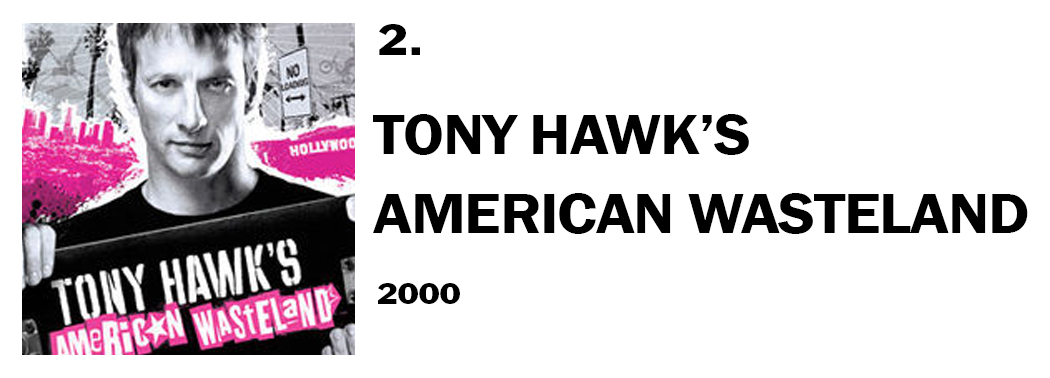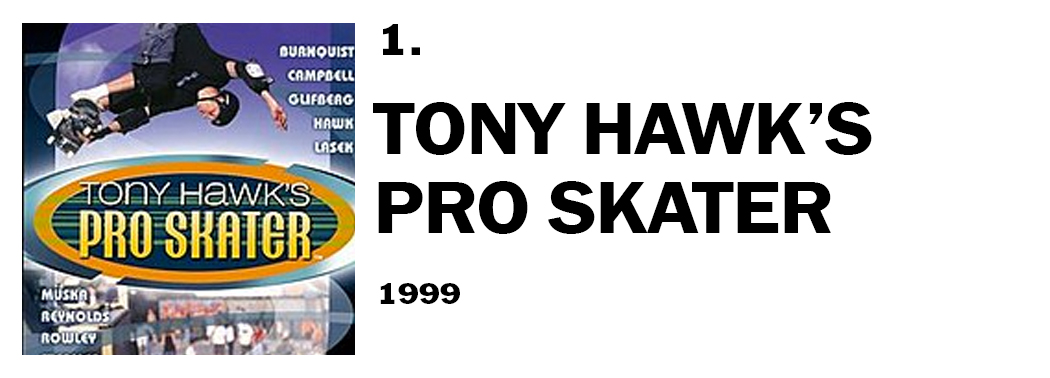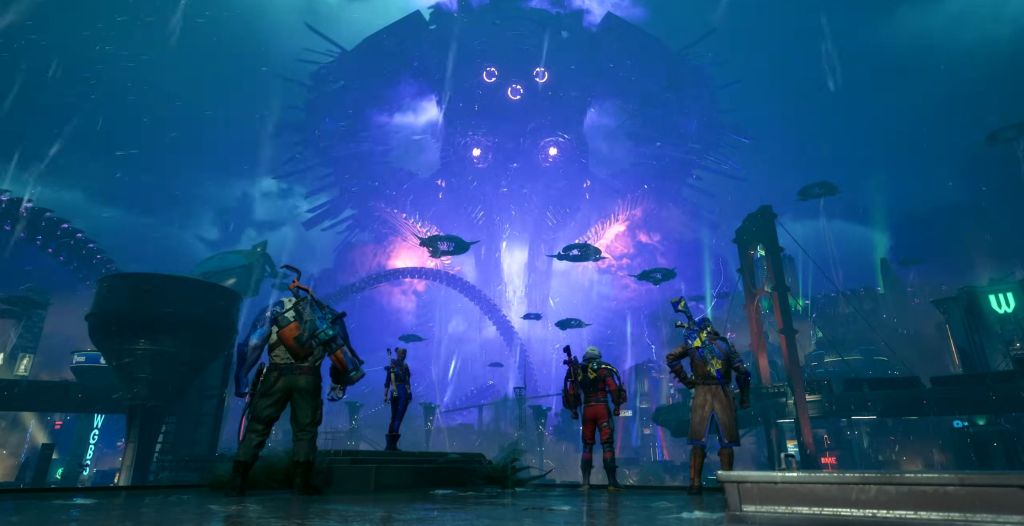In Rank Your Records, we talk to artists who have amassed substantial discographies over the years and ask them to rate their releases in order of personal preference.
The Tony Hawk’s Pro Skater video game franchise did a lot of things for skateboarding. Besides giving skateboarders their sport’s first legitimately enjoyable game, it launched underground skateboard culture into the mainstream. Since its inaugural edition was released in 1999, the Tony Hawk’s series has brought previously unknown names of pro skaters and skate lingo into the homes of millions. If your grandma knows what a kickflip is, Hawk is probably the reason. The wildly popular games also gave a huge platform to one of skateboarding culture’s most integral components: Its music.
Videos by VICE
Through its soundtracks, the Tony Hawk’s franchise has been an influential music discovery tool, introducing gamers to hundreds of artists, predominantly from the worlds of punk and hip-hop, from Dead Kennedys to Blackalicious. And for the millions who grew up playing the games, hearing “Superman” by Goldfinger or “When Worlds Collide” by Powerman 5000 is enough to immediately trigger youthful nostalgia.
Hawk himself didn’t hand-curate every soundtrack from start to finish, but his tastes are certainly reflected in them. “Pretty much every game, I’d say a list of at least 20 to 30 bands or songs that I felt like were along the same genres or along the same influential lines,” Hawk explains. “And I would say, ‘Please go after these on my behalf.’”
Hawk looked back at his long-running, beloved video game franchise and played favorites with the soundtracks.

Noisey: You have the newest at the bottom of your list. Why?
Tony Hawk: Because of the lack of resources we had to do it, by the time that game was finished, they had completely gone through their budget, for the most part, for the development. There was very little left for the soundtrack. We had to just go with bands that would give us songs for very cheap. It doesn’t mean that the quality was different, it just wasn’t as big of a soundtrack. I guess, ironically, a lot of the songs were chosen by me personally because they were favors from friends.
That was the game that kind of went back to the roots of the first few, with timed runs and everything. Did it feel like that process again since you had more input to hand-pick the music?
Well, I hand-picked it because we had this very small budget, and I knew I could call in some favors.
That’s definitely a good position to be in.
Yeah, but it just wasn’t as well-rounded.

That was the same issue—just no budget, few resources, and trying to do it the best we could with what we had.

There were a bunch of songs on that one that I thought were really good. I think we had Beck on that one, too.
Yeah, you had “Gamma Ray” on that one.
Yeah, so in my eyes, we’re coming of age if we could get Beck on our soundtrack.
There are some big names on that one. Queens of the Stone Age, Green Day—
Yeah Yeah Yeahs.
Kenny Rogers
Oh yeah. [Laughs]
There’s always at least one song on the soundtrack that, I don’t want to say they’re outliers, because all kinds of songs end up in skate videos, but you’ll hear stuff like Suicidal Tendencies and Agent Orange, and then you hear Kenny Rogers.
Yeah, I think that was from the original influence of the Neversoft crew. Joel Jewett, who was the head of Neversoft, was this super eccentric, funny, like, cowboy dude, but living in tech land. And so, like, Johnny Cash was on one. I can’t remember which one.
That was on Underground 2.
Yeah. So that’s definitely straight from Joel.

This was still with Neversoft, right? There was plenty of old California punk, with things like Descendents, but it seemed like it captured more of what was big at the time, like some metalcore and 2000s pop punk.
Yeah, that was more of a reflection on the demographics of that game, because that was our first Wii game. So, we knew it was going to skew younger. So that was definitely intentional that there was more sort of popular, less experimental bands. Or, you know, less punk, so to speak.
It still had some of those things you’d expect from a Tony Hawk game, like Bouncing Souls and Public Enemy.
I think we were just trying to lean it more in stuff that was in the mainstream.

I don’t remember exactly Project 8. I think, at that point, it just started getting so big that I was starting to lose track and maybe even control of it. Not all together, but it was really hard to see it as a cohesive body of work, so to speak. I think it was just starting to get so big that it’s hard to keep the focus of it.

I was a little surprised to see Tony Hawk’s Pro Skater 3 ranked this low. This was the first on PS2 where you had more memory to physically fit more music onto a game. This was the one I remember with things like AFI and cKy, too.
I don’t know. When I think of skating history and culture, I don’t think of AFI and cKy. That’s probably why. They’re connected to skating and the sounds of skating, but not, to me, the history of skating.
That one also had “Blitzkrieg Bop” on it, too.
Yeah, well, in all transparency, I’m not the biggest Ramones fan.
That’s not going to insult me, but a few people reading might be disappointed.
I don’t know. I never was, really. To me, they were more East Coast. And I know they were definitely one of the foundations of punk, but it didn’t grab me the way that Dead Kennedys or Circle Jerks did.
It’s funny, there are a few bands on this soundtrack that especially click for me as “Tony Hawk bands.” Like, I’m never going to hear that Bodyjar song without picturing this game.
Oh, yeah, of course.
So, obviously, people don’t necessarily feel like that with “Blitzkrieg Bop,” but I think a lot of people might see this as a turning point where people were introduced to music from the video game.
Oh, for sure, and I’m proud of that.

This was the last one with Neversoft. Did you know this was going to be the last time working with them?
No, actually, they started to work on a new game. We started doing the early stages of a new game after that one, and that was when they decided they were going to put their resources into Call of Duty.
Did that affect the budget for the soundtrack at all? Because this was still a pretty big one.
No, that was still the gravy days. That was definitely when we were still doing well. That was right around when Skate got released. So, I think that was their main decision was to—once Skate got released, that sort of split the market for us, including the sales. And that’s when they couldn’t rely on the big numbers anymore.
You guys still had big names like Nirvana and Foo Fighters. And “Sympathy for the Devil” is on that one. That might be the outlier track on that one.
I suppose, but I don’t know. I always think even that song is more connected, even by proxy, to punk, you know? Jane’s Addiction did it. I’ve always felt that there are a couple of Rolling Stones tracks that truly live in our genre.

To me, that was just such an expansive game and expansive soundtrack. It also feels like you kind of shared that game with Bam Margera, too. Did he have any input in the soundtrack? And on that note, did any of the skaters in the game have input?
Um, yeah, I can’t remember any specific examples. For sure, cKy is in there because of Bam. That for sure happened. I don’t remember if HIM is in there or not, but if they were, it was because of Bam.

I was surprised this one was far down. This is the one that you said is the “first” one in your brain.
It’s just because, I love that soundtrack, but it’s the first one that set the tone, so I had to save that for more of the top places. The second one, there are some tracks that I really love from it, but there were more from some that were newer bands. That’s why I didn’t put it up toward the top.
Having finished the first one, did you consciously do anything different for the sequel?
Just trying to include more bands from my history.

This one was definitely a turning point for the franchise in a lot of ways.
Yeah, that one was really expansive. The tracklist was almost tripled or quadrupled at that point.
Tony Hawk 4 was big, but this game was the first with a real cinematic story. Did that play into creating the soundtrack?
I wasn’t in those conversations, but for sure, the idea that the media would fit that much on it that we wanted to take advantage of it.

I think what stepped this one up for me, in terms of the list, was Toy Dolls, Sex Pistols, De La Soul, and “TNT” [by AC/DC]. That was it. “TNT” was the breakout track from that one.
How did Chad Muska convince you to put three of his Muskabeatz songs on that one?
[Laughs] That would’ve been straight with the music department.
So, in a way, he went behind your back and snuck his stuff on there?
Yeah, but it worked! At this point, I trusted the music department explicitly. We had already done so much and had so much success that it was like, I knew they knew what they were doing, the same way that I knew Neversoft understood skateboarding, finally. We didn’t have to explain any nuances or basics to them.
That’s a good point, really. Obviously skateboarding was big for the people who did it, but you had to introduce it to the masses and market it to people who otherwise might not care or know about it. To capture the community accurately and appropriately, music was obviously a big part of that. Did that feel daunting?
Actually, it didn’t feel daunting, because to me it was exciting. It was like, we got free reign to do something like this, and we’re not being told by some big marketing agency, like, “No, this is the hot new band,” or “No, this is what the kids are listening to.” No, we’re representing skateboarding, so we can grab skateboarding culture and history, and include it in this.
It seems like you definitely lucked out with Neversoft that they got it.
I guess the beauty in that was that those bands were stoked to get the attention, because they hadn’t been getting a lot of action then. And it was probably a little cheaper in that time, even with the labels. The whole learning process for Neversoft, and for me teaching them skating and skate culture, and bringing in this whole crew of skaters, it was really fun. And to their credit, they embraced it. They lived it. They’d literally have a Neversoft day at the skatepark every two weeks. They’d drag everyone to, what was that park, Skate Street? One guy broke his ankle. They had a kickflip challenge in their office. They were really living it.
After the third game, I didn’t even have to explain to them what tricks were or who was doing what, because they were consuming every skate video and every magazine, and they understood trick names. It was really cool.

I’m really excited to talk about American Wasteland.
Oh, that was such a blast. That was the most fun for me because I got to request, not just songs, but bands. Alkaline Trio did “Wash Away.” The TSOL original song is super hard to find, and it’s not a good recording anyway.
Did you pick that for them, or did you just reach out to them and ask them to do a cover?
We sort of put a blanket offer out. So, it was like, “Hey, we’d love you to do a cover of old punk bands, such as this, this, this.” And they’d come back with their choices.
I go back to that Alkaline Trio cover and Saves the Day doing “Sonic Reducer” all the time.
That, too. I remember seeing Ian MacKaye around that time, and we were talking about the soundtrack. And he said, “Yeah, I think Thrice wants to do ‘Seeing Red.’” And, you know, he’s not one to do any corporate stuff or let anyone use their music. And he’s like, “I think we’re gonna let them do that.” That was really cool. That was one of the best validations I could’ve gotten—Ian MacKaye approving someone covering a song for our soundtrack.

Finally, we have the first soundtrack. When you were approached to make this game, what was the first discussion about the music that you were involved in?
Whatever was connected to skating and my history of skating was my first go-to. Like, Dead Kennedys and Primus, those were top of the heap. It’s funny, because I threw out Dead Kennedys thinking there’s no way we could ever use a Dead Kennedys song because of the lyrics. And when they came back and said, “Oh, yeah, we can use ‘Police Truck.’” I was like, “Did you guys listen to ‘Police Truck?’ Do you know what they’re singing about?”
It was censored, though, wasn’t it?
They censored it, but I just never imagined it could be censored.
Kind of similar to Ian MacKaye giving the OK to use Minor Threat songs, Jello Biafra isn’t one to say OK to censorship. He was pretty clear about that.
They just muted “shit,” “dick,” all that stuff.
Was there ever one artist or one band that you always wanted but, for whatever reason, it never worked out?
That’s a good question. I feel like there was, but I think we ended up getting it later. I think “Wild in the Streets” was on one of them, right? I think I wanted that originally.
That was one you wanted for the first game?
Yeah. But there’s something to be said for that. Because even for the first game, I approached certain skaters, and they were skeptical, and just chose not to do it. No one knew what it was going to be like or how it would represent skating. So some people backed out. Like, Eric Koston wasn’t in the first game. I think the same probably went for the soundtrack. I wasn’t in those discussions directly, but I believe that some bands were hesitant because they just didn’t know what it was going to be like.
Is there anything else that you wanted to add about the soundtracks that I haven’t asked about?
I don’t think so! Going forward with games, I would feel an immense pressure to live up to the soundtrack quality that we’ve had. I definitely feel like those discussions were the hardest I’ve had, especially with the later games. We had a finite budget, and we had to allocate it, and some tracks we just couldn’t get because the money wasn’t there. That was frustrating at the time, and knowing how much people expect from it was something that I still hold dear, you know? I don’t discount that at all.
Was there ever a time an artist approached you about being in a game, and you were just like, “eh?”
Yeah, definitely more mainstream, just sort of pop music stuff. People were like, “Oh, I really want a track in that!” I would just sort of pass it off to someone else to say no. I’m almost positive that—who’s the girl in Black Eyed Peas?
Fergie.
Fergie. Yeah. I think she mentioned something to me once about getting a song in a game, and that was sort of when I was like, “Yeah, I don’t know about that. It’s probably not fitting.” But it’s hard, because you want to be nice to everyone and appreciate their artistic expression. It just doesn’t fit with our genre or our audience.
More
From VICE
-

Collage by VICE -

Screenshot: Warner Bros. Games -

(Photo by kckate16 / Getty Images) -

Collage by VICE
